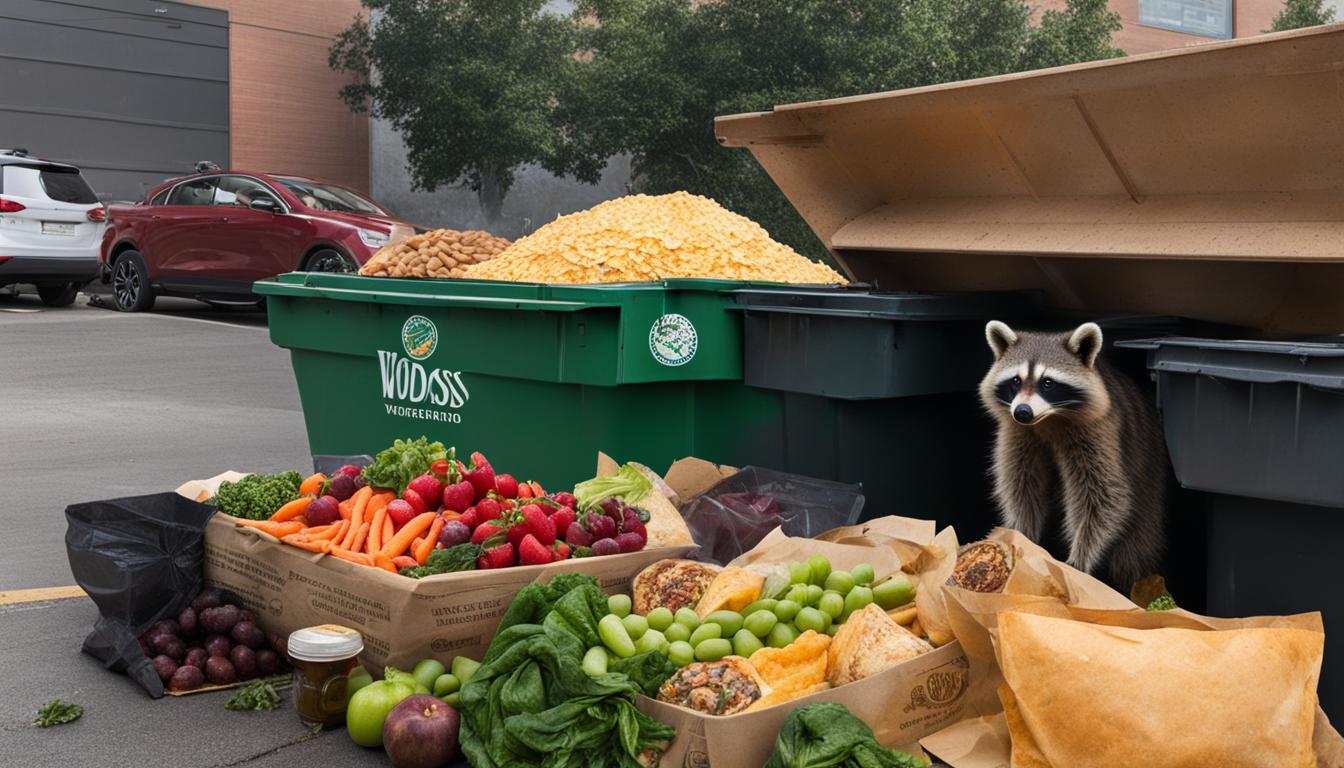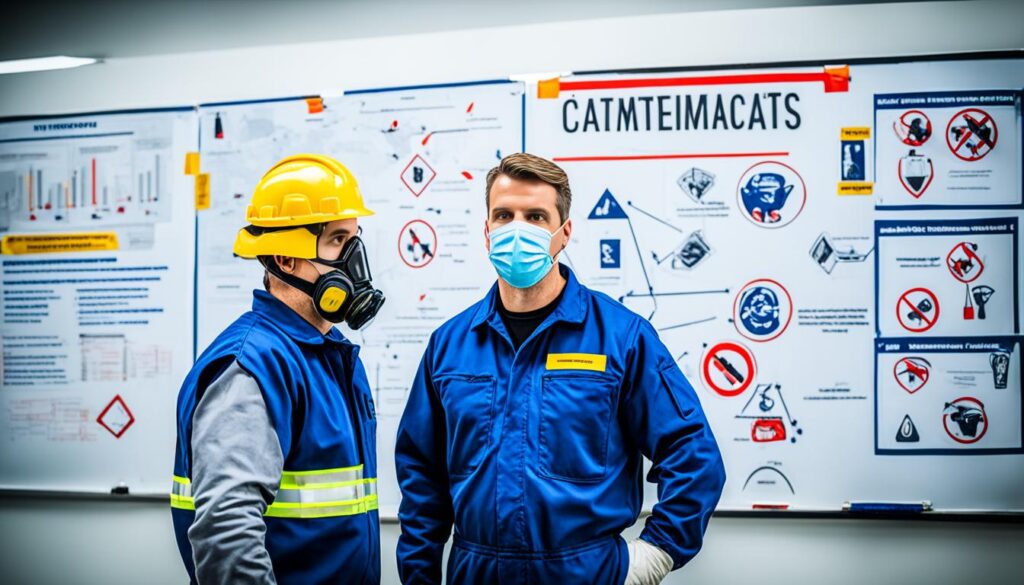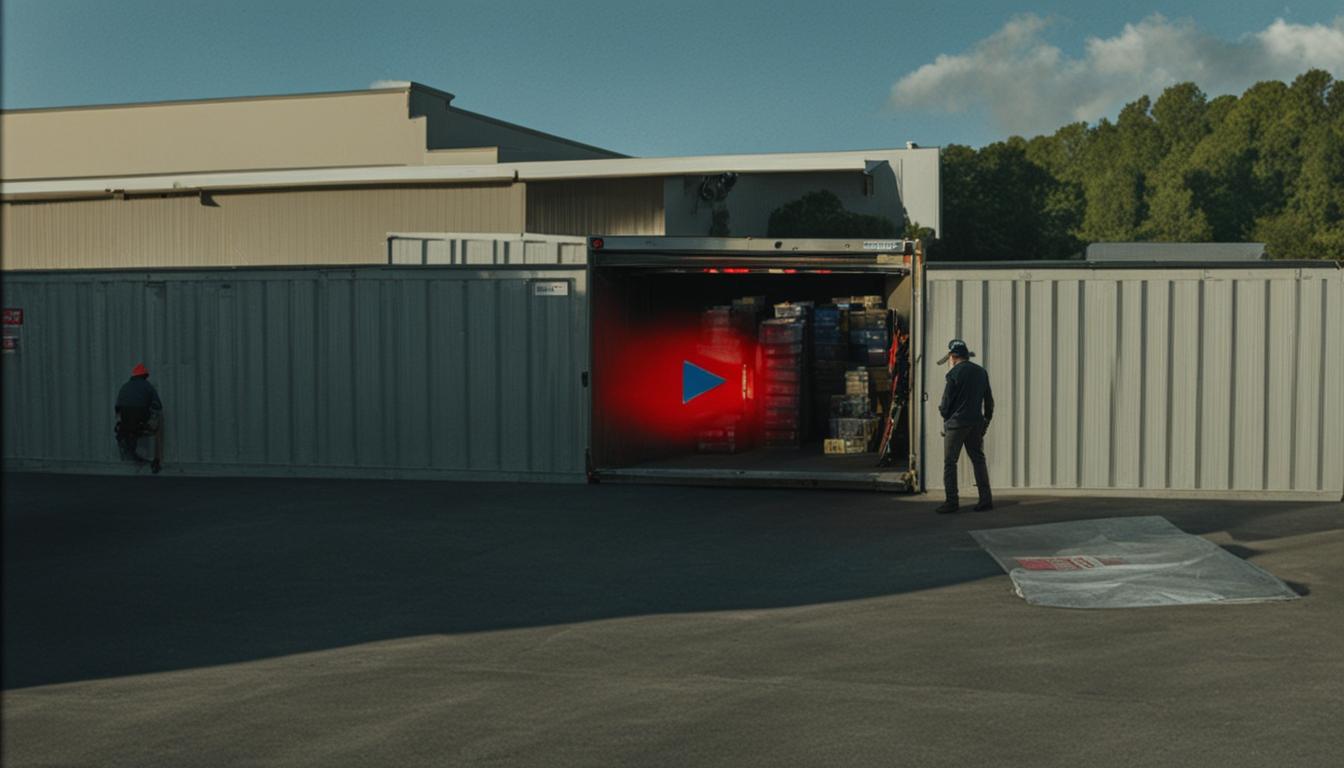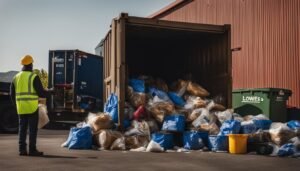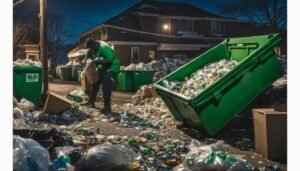Disclosure: This Post Contains Affiliate Links; We earn a commission on purchases.
Are you curious about the practice of dumpster diving at H-E-B? Wondering about its legality and the protocols involved? Let’s dive into the details.
Key Takeaways:
- Dumpster diving at H-E-B during a winter storm attracted numerous scavengers, but the food was deemed rotten and unsafe to eat.
- H-E-B explains that due to the power outage, they had to dispose of perishable foods that couldn’t maintain proper temperatures.
- Donating the items to food pantries or food banks was not possible due to quality and safety standards.
- Dumpster diving at H-E-B during this incident posed health risks to those involved.
- It is crucial to consider the legality and safety concerns surrounding dumpster diving.
Dumpster Diving Incident at H-E-B Store
Following a power outage, an H-E-B store in Austin, Texas experienced a dumpster diving incident that garnered significant attention. Witnesses and local authorities reported that the store’s employees were discarding meat and perishable foods that had started to spoil. The incident took an unexpected turn when someone posted about the “free food” at the store’s dumpsters on social media, attracting over 250 people who eagerly gathered and began fighting over the discarded items.
This chaotic scene illustrated the desperation caused by the power outage and the scarcity of food resources. However, both Constable George Morales and H-E-B issued warnings against consuming any of the dumpster food. They emphasized that the food was spoiled and unsafe for consumption, emphasizing the potential health risks associated with consuming such items.
“Dumpster diving incident at H-E-B store highlights the risks involved in consuming discarded food that may be spoiled and unsafe.”
The incident revealed the profound impact of power outages on food disposal and the consequences it can have on individuals seeking sustenance in dire situations. It is crucial to highlight the importance of food safety and the disposal protocols followed by H-E-B, even during unprecedented events such as a power outage. While dumpster diving may seem like an opportunity to obtain free food, it is essential to prioritize health and adhere to the proper guidelines for food consumption.
As we delve deeper into the reasons for food disposal at H-E-B and the associated health risks, it becomes evident that dumpster diving is not a viable solution.
Reasons for Food Disposal at H-E-B
H-E-B issued a statement explaining the reasons behind their food disposal during the winter storm’s power outage. The store faced challenges in maintaining proper temperature control for certain perishable foods, forcing them to make the difficult decision to dispose of these items. This action was essential to ensure adherence to H-E-B’s stringent food quality and safety standards.
The power outage severely impacted H-E-B’s ability to preserve the freshness and integrity of perishable foods, making them unsuitable for consumption. It is crucial to prioritize food safety and ensure that customers are not exposed to any health risks. Although it was a challenging and unfortunate situation, H-E-B had to prioritize the well-being of their customers and uphold their commitment to providing safe and high-quality products.
To further underscore their dedication to combating food waste and supporting their local community, H-E-B’s statement highlighted their longstanding partnership with Texas food banks. Each year, H-E-B donates over 34 million pounds of food to these organizations, ensuring that those in need receive the necessary support. This commitment reflects H-E-B’s values of serving the community and reducing food insecurity, reinforcing their position as a trusted grocery store.
In summary, the power outage caused by the winter storm severely impacted H-E-B’s ability to maintain food safety and quality standards. As a result, the store had to dispose of perishable items to ensure the well-being of their customers. However, their ongoing commitment to fighting food waste and supporting Texas food banks demonstrates their dedication to the community, even in challenging circumstances.
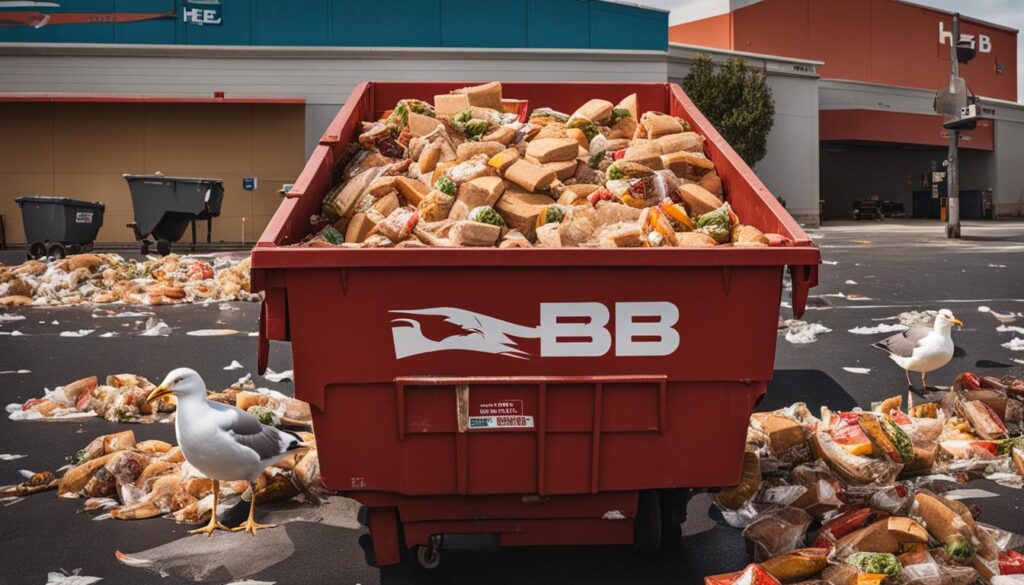
Impact of Power Outage on Food Safety Standards
“The power outage made it impossible for us to maintain proper temperature control for certain perishable foods. When this situation occurs, we must adhere to our food quality and safety standards, which means disposing of the items. Our commitment to food pantries and food banks is ongoing.”
– H-E-B Statement
| Impact of Power Outage on H-E-B | Solutions Implemented |
|---|---|
| Disrupted temperature control for perishable foods | Immediate disposal of affected items |
| Ensured adherence to food safety standards | Strict disposal protocols |
| Prevented potential health risks for customers | Protection of public health |
Health Risks of Dumpster Diving at H-E-B
Dumpster diving at H-E-B during the winter storm posed significant health risks. The discarded food in the dumpsters was spoiled and unfit for consumption, as confirmed by law enforcement and H-E-B officials. Consuming such food could lead to foodborne illnesses and other health complications. Dumpster divers were warned to avoid eating the food and to inform others who had obtained it that it was unsafe.
Dumpster diving may seem like an opportunity to find free food, but the risks involved cannot be ignored. The spoiled food found in the dumpsters at H-E-B presented serious health hazards. It is important to understand the potential dangers of consuming food that has been disposed of, as it can have severe consequences for your well-being.
The health hazards of eating spoiled food include:
- Foodborne illnesses: Consuming spoiled food increases the risk of food poisoning, which can cause symptoms such as nausea, vomiting, diarrhea, and abdominal pain. Bacteria, viruses, and parasites that contaminate spoiled food can lead to serious health complications.
- Toxic substances: Spoiled food can produce toxins and harmful substances that are dangerous when ingested. Mold, for example, can release mycotoxins that have detrimental effects on the body.
- Allergic reactions: Some individuals may be allergic to certain types of spoiled food, leading to allergic reactions that range from mild discomfort to severe anaphylaxis.
- Spread of diseases: When food is disposed of due to contamination or spoilage, it can serve as a breeding ground for bacteria and other microorganisms that can spread diseases. Eating such food puts you at risk of contracting these diseases.
Dumpster divers need to be aware of these health risks and understand that consuming food found in dumpsters, especially at H-E-B during the winter storm incident, is unsafe. Therefore, it is strongly advised to refrain from eating food obtained through dumpster diving and to educate others about the potential dangers.
Remember, prioritizing your health and safety should always be the top concern when it comes to food consumption.
| Health Risks of Dumpster Diving at H-E-B | Precautions |
|---|---|
| Foodborne illnesses | Always ensure that the food you consume comes from reliable sources and is within its expiration date. |
| Toxic substances | Avoid consuming food that shows signs of spoilage, such as mold or unusual odors. |
| Allergic reactions | Know your allergies and avoid consuming food that may contain potential allergens. |
| Spread of diseases | Follow proper hygiene practices, such as washing your hands before handling food and ensuring food is stored and cooked correctly. |
Dumpster Diving Incident Impacted by Power Outage
The dumpster diving incident at H-E-B was directly impacted by the power outage caused by the winter storm. As a result of the power outage, the store was unable to maintain proper temperatures for certain perishable foods, leading to their disposal.
This power outage had significant consequences, not only affecting the availability of food but also limiting the store’s ability to donate it to food pantries and food banks. The inability to donate these items further exacerbated the impact of the incident, highlighting the broader consequences of power outages on food waste and resource distribution during emergency situations.
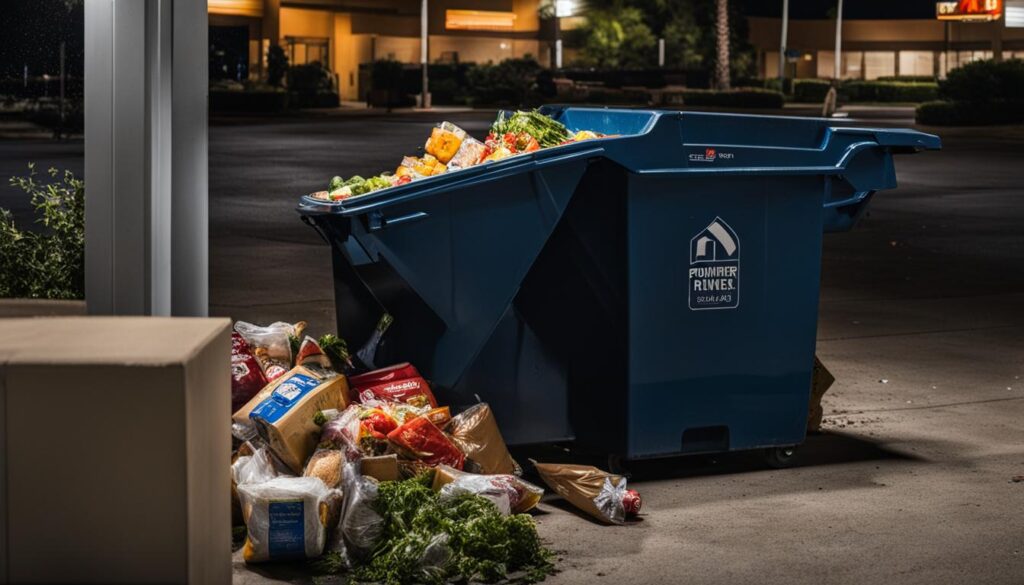
Power Outage Consequences
The power outage that occurred during the winter storm had far-reaching consequences for H-E-B and its operations. The inability to maintain proper temperature control for perishable foods forced the store to dispose of these items, resulting in significant food waste.
Furthermore, the power outage hindered H-E-B’s ability to donate the food to organizations that could have distributed it to those in need. This not only affected the store’s commitment to supporting local communities but also highlighted the challenges faced by food banks and pantries in the aftermath of a power outage.
Winter Storm Aftermath
The dumpster diving incident at H-E-B serves as a stark reminder of the aftermath that winter storms can leave in their wake. The disruption caused by the power outage not only impacted the availability of essential supplies but also created a situation where discarded food became the subject of contention and potential health risks.
This incident underscores the importance of preparing for and mitigating the consequences of winter storms, not only in terms of power restoration but also in ensuring the safe handling and disposal of perishable items to avoid health hazards and foodborne illnesses.
| Impact | Consequence |
|---|---|
| Food Waste | Significant amounts of perishable food had to be disposed of due to the power outage. |
| Resource Distribution | The inability to donate the food items to food banks and pantries disrupted the distribution of resources to those in need. |
| Public Health Risks | The consumption of spoiled food from dumpsters posed health risks to individuals involved in the incident. |
Conclusion
As the dumpster diving incident at H-E-B during the winter storm showed, engaging in this practice raises important questions concerning its legality and safety. It is vital to understand that dumpster diving carries inherent health risks, particularly when the food obtained is spoiled and unsuitable for consumption. In the case of H-E-B, their commitment to upholding food quality and safety standards required them to dispose of perishable items.
While dumpster diving may appear as an opportunity to obtain free food, it is crucial to consider the potential consequences and adhere to legal and health guidelines surrounding waste disposal and food safety. Dumpster diving poses significant health hazards when individuals consume food that has been deemed unfit for consumption by law enforcement and authorized personnel.
To prioritize personal well-being, it is essential to exercise caution and take necessary precautions when considering dumpster diving. Understanding the legality of such practices in your area, as well as being aware of the potential health risks associated with consuming discarded food, can help mitigate any negative outcomes. By doing so, individuals can protect their health and make informed decisions regarding food sourcing in emergency situations.
Source Links
- https://abc13.com/heb-william-cannon-austin-tx-texas-dumpster-diving-winter-storm-power-outage/12764167/
- https://www.foxbusiness.com/economy/chaos-austin-amid-power-outages-residents-seen-dumpster-diving-heb-grocery-store
- https://1073kissfmtexas.com/hundreds-of-people-went-dumpster-diving-for-food-at-texas-h-e-b-store/

Subscribe to Our Newsletter

